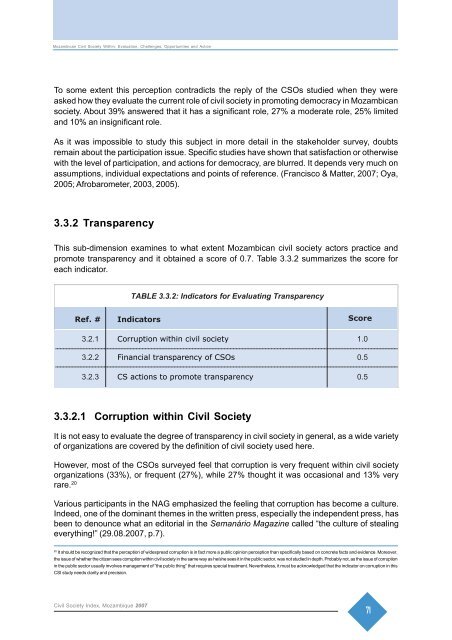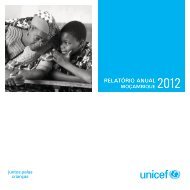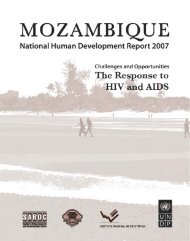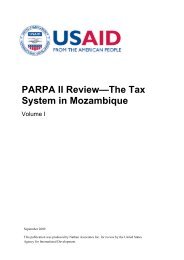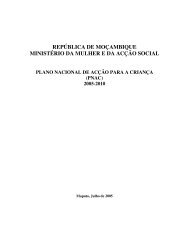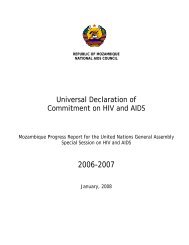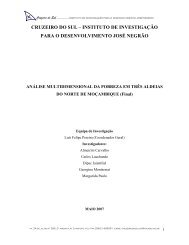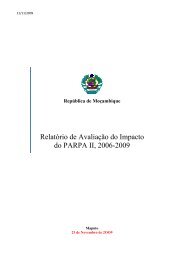Mozambican Civil Society Within: - UNICEF Mozambique - Home page
Mozambican Civil Society Within: - UNICEF Mozambique - Home page
Mozambican Civil Society Within: - UNICEF Mozambique - Home page
You also want an ePaper? Increase the reach of your titles
YUMPU automatically turns print PDFs into web optimized ePapers that Google loves.
<strong>Mozambican</strong> <strong>Civil</strong> <strong>Society</strong> <strong>Within</strong>: Evaluation, Challenges, Opportunities and Action<br />
To some extent this perception contradicts the reply of the CSOs studied when they were<br />
asked how they evaluate the current role of civil society in promoting democracy in <strong>Mozambican</strong><br />
society. About 39% answered that it has a significant role, 27% a moderate role, 25% limited<br />
and 10% an insignificant role.<br />
As it was impossible to study this subject in more detail in the stakeholder survey, doubts<br />
remain about the participation issue. Specific studies have shown that satisfaction or otherwise<br />
with the level of participation, and actions for democracy, are blurred. It depends very much on<br />
assumptions, individual expectations and points of reference. (Francisco & Matter, 2007; Oya,<br />
2005; Afrobarometer, 2003, 2005).<br />
3.3.2 Transparency<br />
This sub-dimension examines to what extent <strong>Mozambican</strong> civil society actors practice and<br />
promote transparency and it obtained a score of 0.7. Table 3.3.2 summarizes the score for<br />
each indicator.<br />
TABLE 3.3.2: Indicators for Evaluating Transparency<br />
Ref. # Indicators Score<br />
3.2.1 Corruption within civil society 1.0<br />
3.2.2 Financial transparency of CSOs 0.5<br />
3.2.3 CS actions to promote transparency 0.5<br />
3.3.2.1 Corruption within <strong>Civil</strong> <strong>Society</strong><br />
It is not easy to evaluate the degree of transparency in civil society in general, as a wide variety<br />
of organizations are covered by the definition of civil society used here.<br />
However, most of the CSOs surveyed feel that corruption is very frequent within civil society<br />
organizations (33%), or frequent (27%), while 27% thought it was occasional and 13% very<br />
rare. 20<br />
Various participants in the NAG emphasized the feeling that corruption has become a culture.<br />
Indeed, one of the dominant themes in the written press, especially the independent press, has<br />
been to denounce what an editorial in the Semanário Magazine called “the culture of stealing<br />
everything!” (29.08.2007, p.7).<br />
20<br />
It should be recognized that the perception of widespread corruption is in fact more a public opinion perception than specifically based on concrete facts and evidence. Moreover,<br />
the issue of whether the citizen sees corruption within civil society in the same way as he/she sees it in the public sector, was not studied in depth. Probably not, as the issue of corruption<br />
in the public sector usually involves management of “the public thing” that requires special treatment. Nevertheless, it must be acknowledged that the indicator on corruption in this<br />
CSI study needs clarity and precision.<br />
<strong>Civil</strong> <strong>Society</strong> Index, <strong>Mozambique</strong> 2007<br />
71


